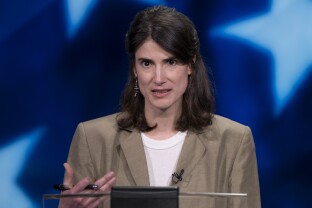Over the last two elections, Democratic Rep. Marie Gluesenkamp Perez has shown that she knows how to win in a largely rural, Republican-leaning district. Now, she’s proposing a bipartisan House task force to consider reforms to the current winner-take-all electoral system.
The resolution, which NOTUS obtained exclusively, is cosponsored by fellow Blue Dog co-chair, Rep. Jared Golden, and is set to be announced by Gluesenkamp Perez on Tuesday afternoon.
The initiative comes as Democrats have begun to look at Golden and Gluesenkamp Perez with wonder after both lawmakers defeated their GOP opponents in R+6 and R+5 districts, respectively, while Vice President Kamala Harris underperformed with just about every demographic.
The proposed task force would include an equal number of Democrats and Republicans and would meet for a year, conducting public hearings and collecting witness testimony, before making a final recommendation to Congress and the president.
In an interview with NOTUS, Gluesenkamp Perez said her drive for serious electoral reform comes from the public’s growing distrust in Congress. She said fewer and fewer seats each cycle have competitive general election races, with 90% of House seats now considered to be “safe” districts.
“My seat was drawn to be a red seat,” Gluesenkamp Perez told NOTUS in an interview in her office. “I think rural America and the trades have really suffered under single-party control.”
She said that, if members know they have “lifetime tenure,” they don’t have the urgency to do constituent casework and understand where the system is failing communities.
“We need that competition,” she said. “We need that urgency.”
She added that one of her goals is to “open the field” and get more candidates with working-class backgrounds running for Congress, “to have people who have turning wrenches, change diapers, drive trucks at the table.”
Many of the electoral reforms mentioned as potential topics for the task force to investigate aren’t new. Democratic lawmakers have floated similar proposals for years, drawing little to no attention.
Some of the proposals in this resolution for the task force to investigate include holding nonpartisan open primaries, establishing independent commissions for redistricting to prevent gerrymandering, to have congressional districts with multiple members and to increase the number of seats in the House beyond 435 representatives.
The number of representatives has been capped since 1929, and multimember districts have been prohibited since 1842. Two electoral reform groups in support of the bill — Fix Our House and Protect Democracy — point to the fact that some state legislatures and other democracies outside the U.S. employ multimember systems.
The two groups also published a letter, signed by 175 political scientists, in support of the task force.
“What’s different in this moment is just a sense of, with each passing election, just how broken our political system feels to so many people,” Lee Drutman, co-founder of Fix Our House, told NOTUS.
“There is a growing frustration that we just can’t keep doing the same thing over and over again,” he said.
Grant Tudor, a policy advocate at Protect Democracy, pointed to multimember districts as a way to ensure the political minority in a district still feels represented in Congress.
“If you have 60% of voters voting red in a district or voting blue in a district, that’s still at 60-40, which seems like it ought to be competitive. But if there’s only a single winner in that district, every single election is more or less going to be guaranteed,” Tudor said.
“Now, if you were to have two or three or four members elected from that district, that issue more or less dissipates,” he said.
So far, the resolution only has Golden as a co-sponsor and has not been proposed to House Speaker Mike Johnson or Minority Leader Hakeem Jeffries, Gluesenkamp Perez said, though she said that she had some positive conversations with Republicans supportive of a task force.
She added that, “90% of us agree on 90% of the issues.”
“Those local issues really can transcend national rhetoric, but there’s been a lot of gamesmanship and apportioning representation in a way that doesn’t reflect that reality that so many of us agree about so much,” Gluesenkamp Perez said.
While many of the ideas proposed for the task force have been considered in the past, Drutman suggested that what’s different now is who’s proposing it. Gluesenkamp Perez and Golden, he said, come from different backgrounds and represent different constituencies compared to the vast majority of their Democratic counterparts.
“There’s not a lot of people like her in Congress right now,” Drutman said of Gluesenkamp Perez.
—
Katherine Swartz is a NOTUS reporter and an Allbritton Journalism Institute fellow.
Sign in
Log into your free account with your email. Don’t have one?
Check your email for a one-time code.
We sent a 4-digit code to . Enter the pin to confirm your account.
New code will be available in 1:00
Let’s try this again.
We encountered an error with the passcode sent to . Please reenter your email.


